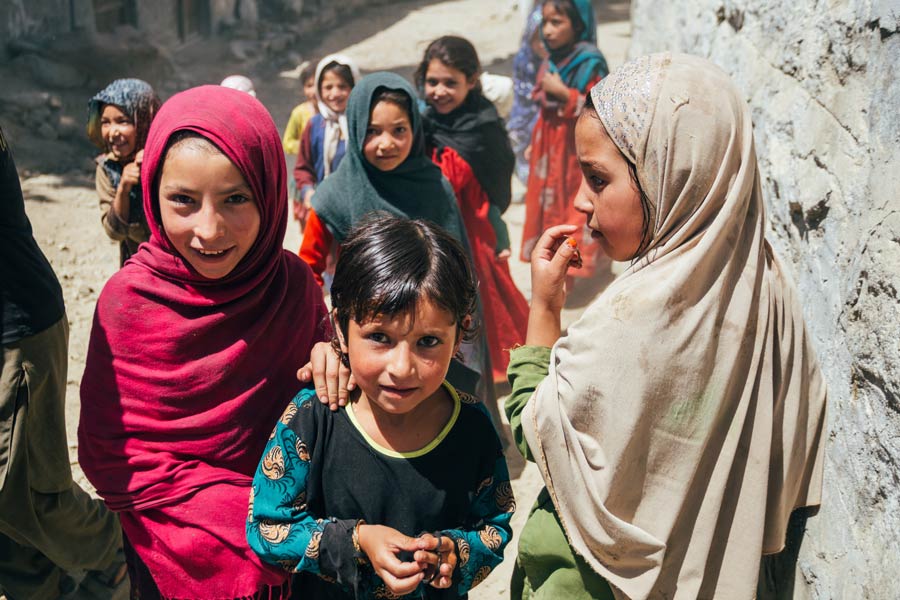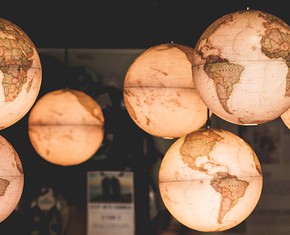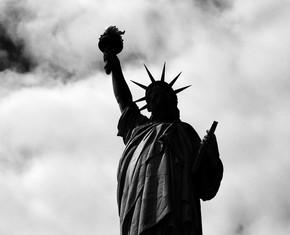The views expressed in our content reflect individual perspectives and do not represent the authoritative views of the Baha'i Faith.
The late political scientist Samuel Huntington coined the label “Davos Man” in 2004 to describe the type of person who attends the World Economic Forum’s annual meeting in that Swiss ski town.
Huntington’s term describes attendees on only a very limited level, especially since they’re about 80% men—the males who wield power and who basically run the world’s economy. This lack of female representation poses a global challenge, reflecting an even wider question: how do we raise the status and participation of girls and women in all areas of human endeavor?
Today my attention was captured by a photograph of an outdoor school in Karachi, ex-capital of Pakistan, started by a girl and her brother for five street children. So powerful was the impact of their initiative, and so great the need, that shortly 250 children began attending, soon to be joined by some adults who also came to study. Significantly, this number included many women and girls, about whom the Baha’i Universal House of Justice observed:
The decision-making agencies involved would do well to consider giving first priority to the education of women and girls, since it is through educated mothers that the benefits of knowledge can be most effectively and rapidly diffused throughout society. – The Promise of World Peace, p. 3.
 The outdoor school in Karachi consisted simply of a number of small but sturdy plastic tables and chairs set on bare ground under the sky. Transport to the school was provided where necessary, and even some pocket money, with school expenses covered by their family and friends. Just $25 is sufficient to help a girl go to school for a year—a simple idea, using simple equipment, for minimal cost, yet capable of changing lives forever.
The outdoor school in Karachi consisted simply of a number of small but sturdy plastic tables and chairs set on bare ground under the sky. Transport to the school was provided where necessary, and even some pocket money, with school expenses covered by their family and friends. Just $25 is sufficient to help a girl go to school for a year—a simple idea, using simple equipment, for minimal cost, yet capable of changing lives forever.
If this is what can be achieved by a young girl and her brother in constrained circumstances, imagine what can be achieved when all girls are educated and resourced!
So, what continues to limit such potential?
The great city of Karachi where this little school began is the business hub of Pakistan, generating much economic activity. Millions of migrants from other provinces are attracted to seek a living here with billions flowing out to their families in other areas, thus making the difference between a family’s survival and a life of misery, since there are few earning opportunities available to them in their own localities.
The Baha’i teachings say this global condition must be remedied:
… under present systems and conditions of government the poor are subject to the greatest need and distress while others more fortunate live in luxury and plenty far beyond their actual necessities. This inequality of portion and privilege is one of the deep and vital problems of human society. That there is need of an equalization and apportionment by which all may possess the comforts and privileges of life is evident. … – Abdu’l-Baha, The Promulgation of Universal Peace, p. 107.
Our actions, Baha’is believe, need to be guided by principle. Individual economic decisions need to accord with lofty ideals, and the purity of these ideals should guide our intentions and consequently become manifest in our actions. Thus, the solution to the economic challenges of our world holds implications regarding the harmony of both the material and spiritual aspects of life, including the equalization of wealth, access to education, and the advancement of women:
No matter how far the material world advances, it cannot establish the happiness of mankind. Only when material and spiritual civilization are linked and coordinated will happiness be assured. …
Therefore, the material and the divine, or merciful, civilizations must progress together until the highest aspirations and desires of humanity shall become realized. – Ibid., pp. 107-109.
The individual initiative of this young girl, aided by her young brother, with a simple outdoor school in Karachi strove to remedy this unfair condition. She and her brother recognized that a lack of universal access to education represents a primary obstacle to success in life.
As the initiative of these two children indicates, things are definitely changing. The Harvard Business Review acknowledged as early as 2008 that women have now become the primary drivers of the world economy:
… globally, they control about $20 trillion in annual consumer spending … In aggregate, women represent a growth market bigger than China and India combined—more than twice as big, in fact. Given those numbers, it would be foolish to ignore or underestimate the female consumer. And yet many companies do just that, even ones that are confident they have a winning strategy when it comes to women.
The Baha’i teachings call for a spiritual and a global solution to our economic problems—and recommend that we focus our attention first on the education of females:
No nation can achieve success unless education is accorded all its citizens. Lack of resources limits the ability of many nations to fulfill this necessity, imposing a certain ordering of priorities. The decision-making agencies involved would do well to consider giving first priority to the education of women and girls, since it is through educated mothers that the benefits of knowledge can be most effectively and rapidly diffused throughout society. In keeping with the requirements of the times, consideration should also be given to teaching the concept of world citizenship as part of the standard education of every child. – The Universal House of Justice, The Promise of World Peace, p. 3.
We must develop a sense of the possibilities of human prosperity, reflected in both our spiritual and material well-being, and forged in the crucible of justice. In Baha’u’llah’s memorable words:
No light can compare with the light of justice. The establishment of order in the world and the tranquillity of the nations depend upon it. – Baha’u’llah, Epistle to the Son of the Wolf, pp. 28-29.
















Comments
Sign in or create an account
Continue with Googleor